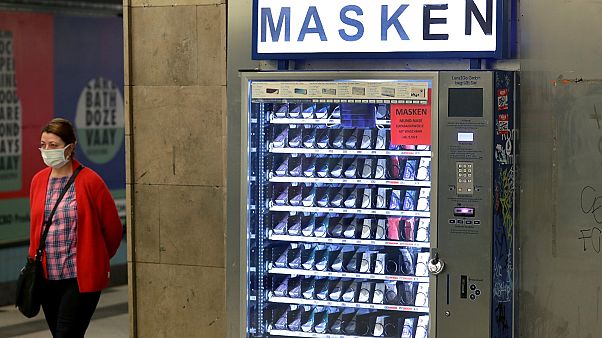GERMANY, AMERICA, ALBERTA MEAT PACKERS ARE SUPER SPREADERS

A woman walks past a vending machine that offers washable face masks in a station of the subway in Berlin, Germany, Monday, April 27, 2020 - Copyright AP Photo/Michael Sohn
Germany has been hailed as a European success story in the fight against coronavirus, but two new major clusters have put authorities on high alert.
Hundreds of new cases of COVID-19 have been recorded among workers at a slaughterhouse near the western city of Gütersloh in North Rhine-Westphalia.
Regional officials said on Wednesday that the number of new COVID-19 cases linked to the Tönnies slaughterhouse in Rheda-Wiedenbrueck had risen to 657.
Meanwhile, in the capital Berlin, 369 households are back under lockdown after dozens of people tested positive for the virus in the southern district of Neukölln.
"We see from these outbreaks that the virus isn't gone," Chancellor Angela Merkel said as she met with Germany's 16 state governors to discuss progress in tackling the pandemic.
Company officials at Tönnies said the outbreak at the slaughterhouse may have been linked to workers taking the opportunity to visit their families in eastern European countries as border controls were relaxed.
Officials ordered the closure of the slaughterhouse, as well as isolation and tests for everyone else who had worked at the site – putting about 7,000 people under quarantine.
Dozens of people tested positive for COVID-19 in the Berlin outbreak, which involves at least six apartment buildings.
"The special thing here is that it went so incredibly fast," said Mayor Martin Hikel. "We realised quite soon that entire apartment blocks were concerned and that we had to put them under quarantine.
"What's also new and what is special is that the housing conditions are extremely tight, and that it is not easy with eight people in a two-room-apartment to stay out of each other's way or to be locked in for two weeks.
"These are now the very special and difficult challenges we have to face. And that makes the work here very difficult and it is a huge challenge to defuse and pacify the situation on site."
As of Wednesday, Berlin had recorded 7,474 cases of COVID-19 and 210 deaths, according to official figures.
The rise in infections in the city came just days after another cluster, accounting for 112 infections and one death, was reported in the north German city of Bremerhaven, according to Deutsche Welle.
On Tuesday, Germany launched its coronavirus tracking app in an effort to track new infections.
Experts say finding new cases quickly is key to clamping down on fresh clusters, especially at a time when European countries are lifting lockdown restrictions and reopening their borders.
On Monday, Germany opened its borders to travellers from the EU, the UK, Switzerland, Norway, Iceland, Liechtenstein, and the UK.
No comments:
Post a Comment